Buy any 1 product and get 1 absolutely free — this offer applies to all Website Templates, UI Kits, and Complete Scripts.
Buy Now!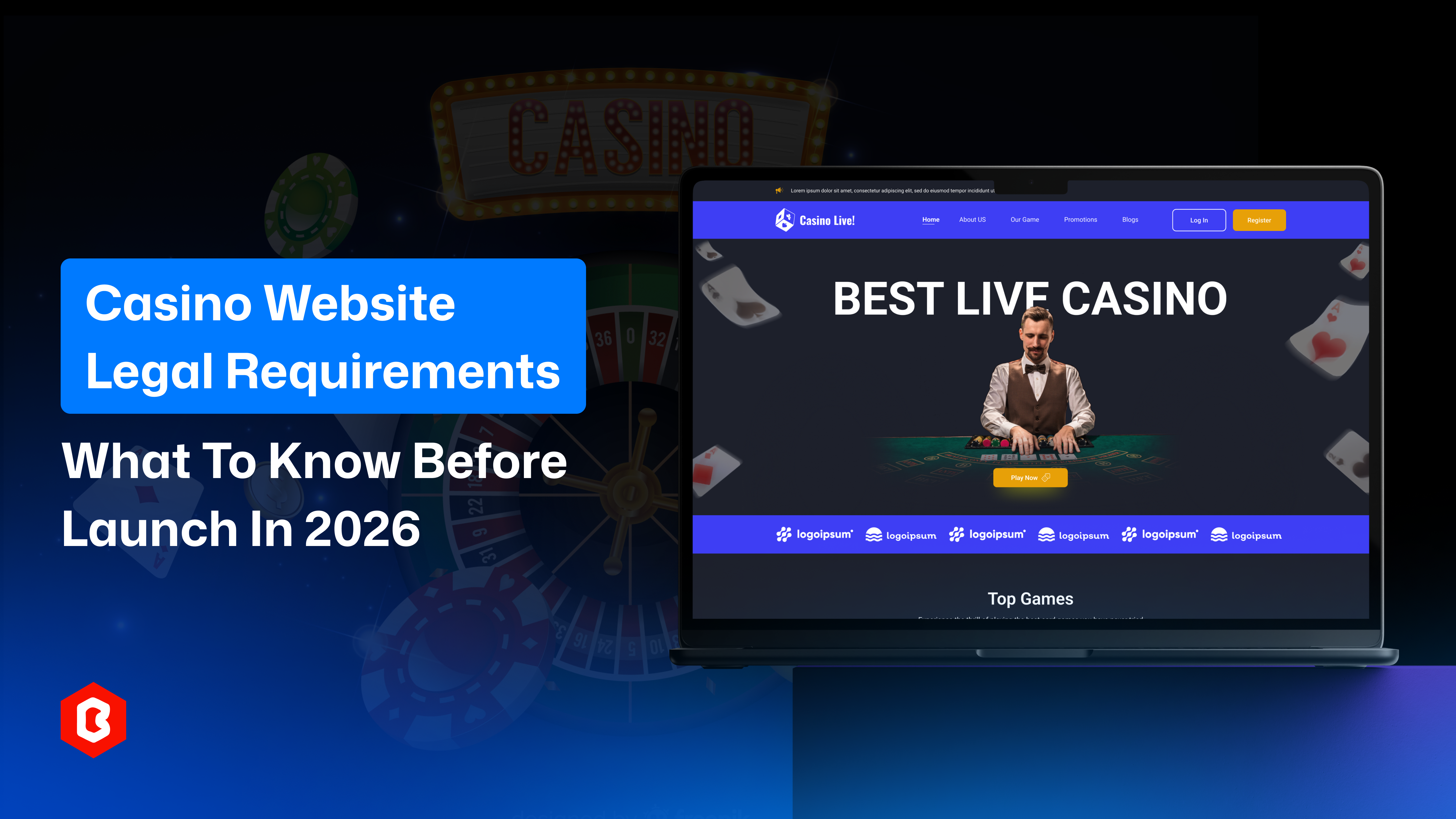
The digital gambling segment is entering its most highly regulated era. Operators stepping into this industry must now satisfy an elevated level of compliance, security, and transparency. While the market potential continues to grow, so does the scrutiny. It’s essential to understand the legal frameworks that govern online casinos worldwide.
This guide lays out everything required to navigate the complex licensing, regulatory, financial, and jurisdictional obligations for launching a casino website in 2026.
Compliance is the foundation on which every legitimate online casino is built. If the legal infrastructure isn’t solid, the entire business is at risk. Regulators in 2026 have zero tolerance for weak verification systems, insecure payments, or inaccurate reporting.
Even small oversights, missing documents, unclear bonus terms, or failure to report suspicious activity can lead to immediate penalties.
Also, in casino website traffic improvement, the legal regulations abide by play a key role.
Here are some aspects to know why legal compliance matters:
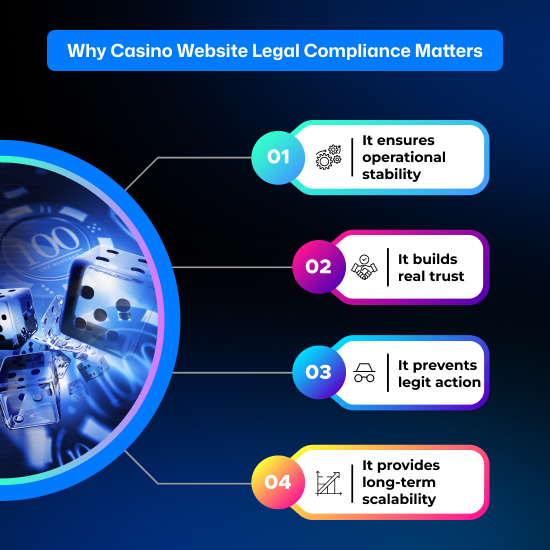
It ensures operational stability. A licensed casino gains uninterrupted access to banking, hosting, and vendor networks. This stability becomes the foundation for long-term growth.
It builds real trust. Players gravitate toward platforms that show transparency and clear consumer protection measures. That level of confidence turns visitors into loyal, returning players.
It prevents enforcement action. Fines issued in major jurisdictions often reach six to seven figures. Staying compliant helps avoid costly disputes and keeps the business running without fear of sudden shutdowns.
It provides long-term scalability. Many global markets only allow partnerships with fully licensed operators. This opens the door to global growth and strong brand credibility.
In an environment where competition is intense, strict compliance becomes a strategic advantage rather than a regulatory burden.
Licensing is more than a formality; it acts as a public declaration that a casino operates with integrity, fairness, and full transparency.
Also, just a custom website development for a casino is not enough to start the business itself. For that, an approval is necessary.
A casino website license is a government authorization confirming that your business meets essential requirements such as secure technology, responsible gaming practices, and proper financial management.
Regulators only grant this license when they are confident that the operator is stable, trustworthy, and prepared for long-term operation. Without it, a casino simply cannot function legally or ethically.
Let’s understand the license types.
Here are the most common licenses of online casinos, important to have for a business:
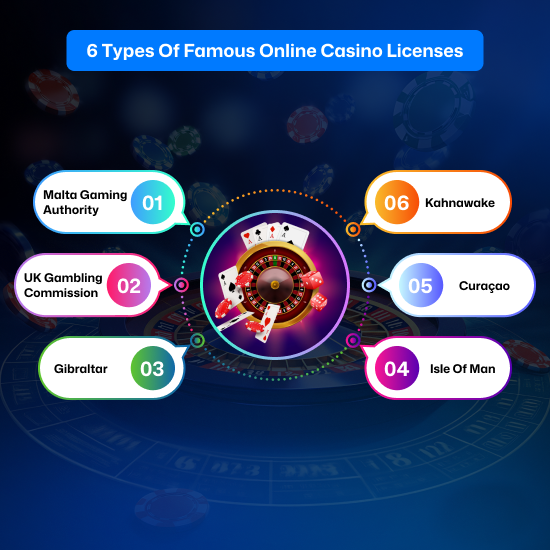
Malta Gaming Authority (MGA).
The MGA license is one of the most reputable credentials in the online gambling industry. It assures players and partners that your operation meets strict European AML standards, fair gameplay rules, and consistent audits.
UK Gambling Commission (UKGC).
The UKGC sets some of the world’s toughest gambling regulations, focusing heavily on player protection and affordability checks. A UKGC license signals that your casino respects consumer rights, uses secure systems, and values transparency.
Gibraltar Gaming Commission.
Gibraltar Gaming Commission licenses are known for their rigorous technical requirements and low tax structure. So, mid and large-scale casino operators prefer it. Regulators expect high-quality internal control systems, ensuring the platform operates ethically and efficiently.
Isle of Man Gambling Supervision Commission (GSC).
This license provides a balance of strong oversight and business-friendly policies. Operators benefit from a well-established regulatory ecosystem that prioritizes fair gaming and cyber resilience.
The Curaçao Gaming Control Board.
With the 2025–2026 regulatory overhaul, Curaçao now enforces stronger AML obligations, improved data handling standards, and mandatory audits. Despite the added requirements, it remains one of the most cost-effective jurisdictions for new casino operators.
Kahnawake Gaming Commission.
This Canadian-based jurisdiction offers a straightforward licensing process and moderate oversight. It appeals to operators who want affordable compliance while still maintaining a legitimate and recognized gaming license.
Now, look at the method for getting a license for an online casino platform.
Here is a complete process to obtain a casino business licence from regulatory authorities:
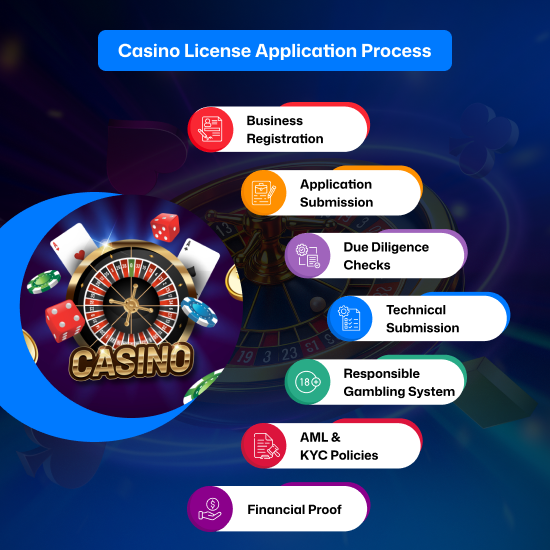
Business Registration.
Before applying, the operator must form a legal entity within the chosen jurisdiction. This step ensures that the business has a recognized legal presence and can be held accountable by regulators.
Application Submission.
Regulators require detailed documentation from ownership and management to evaluate the legitimacy of the business. Submitting accurate, clear, and complete materials speeds up the approval process.
Due Diligence Checks.
Authorities conduct background checks on stakeholders to verify financial stability and ensure no history of wrongdoing. This process helps protect players by ensuring only responsible individuals run gaming operations.
Technical Submission.
You must demonstrate that your gaming platform follows certified fairness standards and uses secure systems. Regulators examine server architecture, RNG certifications, and software provider agreements to ensure reliability.
Responsible Gambling Systems.
Tools like deposit limits, self-exclusion features, and cooling-off periods help protect vulnerable players. Regulators look closely at these features to confirm your casino offers a safe environment.
AML & KYC Policies.
Anti-Money Laundering rules require clear procedures for monitoring transactions, identifying suspicious activity, and verifying player identities. Proper implementation protects both the business and the financial ecosystem. KYC compliance also helps prevent fraud.
Financial Proof.
Regulators expect operators to show they have enough capital to run the casino, pay winnings, and support ongoing operations. Strong financial backing reassures authorities that you can maintain stability even during fluctuations in revenue.
Applications may take three to six months, depending on jurisdiction, completeness of documentation, and the complexity of the business model.
When you are going to make a website for an online casino, the following legal documents you have to keep ready:
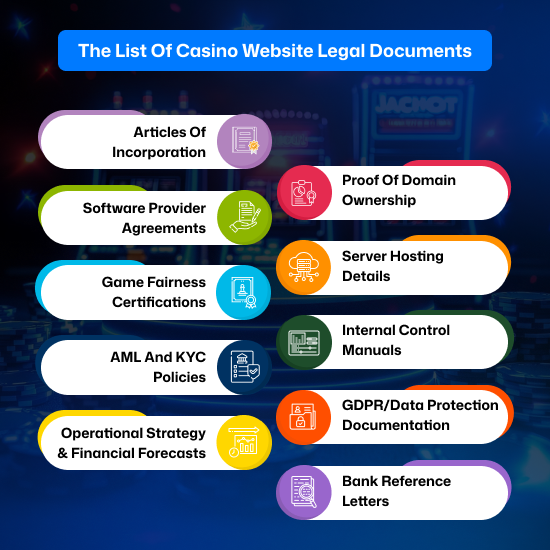
Articles of Incorporation. Establishes your business’s legal identity and ownership structure, which regulators use to verify legitimacy.
Proof of Domain Ownership. Shows that your business controls the domain where gambling services will be provided. This ensures transparency during audits.
Software Provider Agreements. Confirms you’ve partnered with licensed, verified gaming providers, which is essential for fair gameplay.
Server Hosting Details. Helps regulators understand where data is stored and how it will be protected from cyber threats.
Game Fairness Certifications. Independent labs certify your Random Number Generator to guarantee unbiased results.
Internal Control Manuals. Outline how your casino operates behind the scenes, including financial safeguards and risk management processes.
AML and KYC Policies. Demonstrates your commitment to preventing money laundering and identity fraud.
GDPR/Data Protection Documentation. Shows that you protect player information and comply with international data laws.
Operational Strategy and Financial Forecasts. Helps regulators understand your business model, projected growth, and financial sustainability.
Bank Reference Letters. Serve as proof of financial credibility and strong banking relationships.
With these documents, the chances of getting an online casino website license become a streamlined task, not a headache.
Understanding how different regions regulate online gambling is crucial for launching a casino website that operates safely and legally. Knowing these details helps operators avoid accidental violations and choose markets that support long-term success.
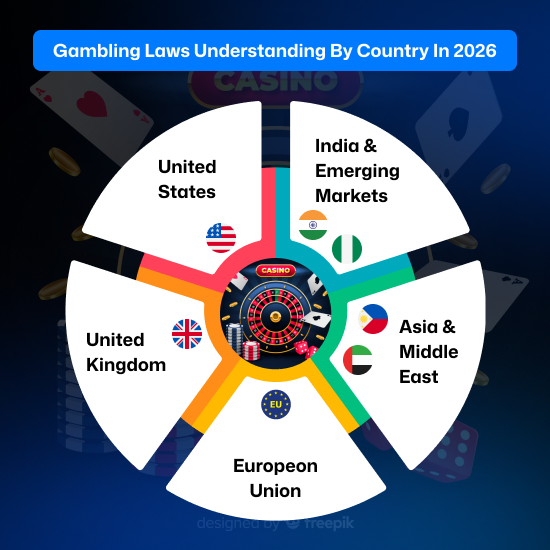
Online casino regulations in the United States are highly fragmented because every state creates its own laws. This means what is legal in one state could be completely restricted in another.
Some states permit full online casinos. States like New Jersey, Michigan, Pennsylvania, and Delaware allow operators to offer full online casino gaming, including slots, table games, and live dealers.
Nevada focuses primarily on online poker. The state primarily allows online poker rather than full casino games, reflecting long-standing concerns about digital slots and table games.
Several states remain restrictive. Texas, Utah, and Hawaii, among others, maintain strict positions against online gambling. Attempting to target players in these states, even unintentionally, can lead to serious regulatory consequences.
The UK continues to enforce some of the world’s strictest online gambling regulations in 2026:
Affordability checks are mandatory. Operators must ensure that players can afford their gambling activity without risking financial harm. This may include analyzing gaming patterns or verifying a player’s financial stability before allowing higher deposits.
Identity verification must be completed before gameplay. Players must verify their identity through official documents before accessing real-money games. This helps prevent underage gambling, fraud, and identity theft.
Marketing rules focus on consumer protection. Advertising must be honest, responsible, and never target vulnerable individuals. Operators must ensure that promotional materials follow strict guidelines. Even social media campaigns are closely monitored.
AML and suspicious activity reporting are heavily enforced. Operators are required to report unusual transactions or behavior that may indicate money laundering. The UKGC treats AML compliance as a top priority.
Detailed audits and ongoing oversight are consistent. UK operators undergo regular audits to confirm they continue meeting regulatory expectations. This includes everything from verifying game fairness to reviewing financial reporting.
The EU does not operate under a single unified gambling law; instead, each country sets its own regulations.
Sweden enforces strict player tracking. Swedish regulators require platforms to monitor player behavior closely and intervene when signs of gambling harm appear.
Spain has strong advertising regulations. Spain restricts the promotion of gambling, especially during daytime television or when marketing could reach minors.
France and Italy require local licensing. Operators cannot simply access these markets with an international license. They must obtain country-specific approvals, pay local taxes, and follow each country’s rules on game offerings and player protections.
Germany imposes strict deposit limits. Germany requires daily deposit caps and enforces restrictions on game speed and formats to reduce addiction risks.
Malta offers flexible licensing for international operators. The MGA license allows casinos to operate globally while maintaining European credibility. Malta’s framework balances strong AML and security requirements with business-friendly policies.
The regulatory environment across Asia and the Middle East is extremely diverse:
The Philippines (PAGCOR) is a major regulated hub. PAGCOR offers structured licenses and regulates both B2C and B2B gambling services. Operators must follow strict responsible gambling rules and undergo regular audits.
Singapore maintains limited but high-quality regulation. The government prioritizes harm reduction, meaning operators must demonstrate strong monitoring, verification, and support systems.
Japan restricts most forms of online casino activity. While Japan has opened land-based integrated resorts, online casino gaming remains largely prohibited. Operators must avoid targeting Japanese players.
Middle Eastern nations largely prohibit gambling. Countries like Saudi Arabia, Qatar, and the UAE maintain strict religious and legal bans on gambling. Casinos must implement geo-blocking and payment restrictions to avoid these markets.
India and several emerging regions represent high-growth opportunities, but regulatory uncertainty is common.
Indian laws vary by state. Some states regulate specific gambling activities, while others ban everything except skill-based gaming. This fragmented environment requires careful compliance planning.
Sikkim and Nagaland support online gambling for certain games. These states offer licenses for skill-based and select chance-based games.
Most states remain legally uncertain. The lack of clarity leaves online casinos in a gray area in many regions. Operators must exercise caution to avoid being perceived as illegal.
Other emerging markets are accelerating regulation. Countries like Brazil, Kenya, and Nigeria are moving toward clearer legal frameworks for online gaming.
Strong compliance ensures safe gameplay, protects users from fraud, and builds long-term trust. It helps casino platforms meet global regulatory expectations confidently.
Know Your Customer (KYC): KYC verifies each player’s identity to prevent fraud, restrict underage access, and ensure only legitimate users participate in real-money gambling.
Anti-Money Laundering (AML): AML systems track unusual behavior, flag suspicious transactions instantly, and help operators protect their platform from financial crime and regulatory penalties.
Data Protection Compliance: Compliance with GDPR and privacy laws safeguards personal data, reinforces transparency, and protects players’ information from misuse or exposure.
Secure Payment Infrastructure: Secure payment gateway systems integration protects deposits and withdrawals with fraud checks, encrypted processing that delivers consistent user trust.
RNG Certification & Game Fairness: Certified RNG testing guarantees every game outcome is random, fair, and transparent, helping players feel confident in the platform’s integrity.
Cybersecurity Standards: Advanced cybersecurity with encryption, penetration testing, and strong network defenses—prevents breaches and protects sensitive operational data from cyber threats.
Responsible Gambling Tools: Responsible gambling features empower players to manage habits safely with deposit limits, activity alerts, time-outs, and long-term self-exclusion options.
Meeting these standards keeps operations legal, trustworthy, and competitive while ensuring a safer experience for every player on the platform.
Understanding tax rules ensures your casino operates legally, maintains financial stability, and avoids penalties while building trust with regulators and players.
The UK uses a point-of-consumption tax. This tax charges operators based on where the player lives, ensuring fair taxation and encouraging licensed casinos to follow strict compliance rules.
Malta applies gaming taxes on GGR. Malta taxes operators on gross gaming revenue, using tiered thresholds that support business growth while maintaining strong industry oversight.
U.S. states apply individual gaming taxes. Every U.S. state sets its own gaming tax rate and licensing fees, requiring operators to customize compliance for each targeted market.
Curaçao offers favorable tax rates. Curaçao’s updated tax framework provides low, predictable rates, helping operators reduce financial pressure while staying compliant with modernized regulations.
Segregated player funds. Operators must store player balances separately from business accounts, guaranteeing withdrawals remain safe even during financial challenges.
Transparent financial reporting. Clear reporting helps regulators track performance, prevent fraud, and ensure operators manage gaming revenue responsibly and accurately.
Regular audits. Independent audits confirm compliance, verify accuracy in financial statements, and reassure regulators that the platform operates with integrity.
Bank-level security in payment operations. High-grade security protects all financial transactions, ensuring deposits, withdrawals, and sensitive data remain fully safe from unauthorized access.
Staying compliant with tax and financial rules strengthens regulatory relationships and ensures your casino website remains stable, trustworthy, and fully licensed.
Avoiding common mistakes protects your platform from penalties, strengthens long-term compliance, and helps you launch with confidence and operational stability.
Not understanding local gambling laws. Misinterpreting regional laws can trigger violations, so operators must study each jurisdiction carefully before offering games or accepting players.
Skipping proper licensing steps. Rushing through licensing causes delays or rejections. Meeting every requirement ensures smoother approvals and a stronger regulatory reputation.
Ignoring AML or KYC expectations. Weak identity checks expose platforms to fraud and penalties, making strict AML and KYC processes essential from day one.
Offering restricted games or services. Providing unapproved games violates licensing rules, so operators must confirm every product is permitted within the targeted jurisdiction.
Poor data protection practices. Weak security risks player information and damages trust; strong encryption and privacy compliance are necessary for every casino website.
Failure to implement responsible gambling tools. Missing harm-prevention features can lead to regulatory action and player issues, so platforms must offer tools that support safer gambling habits.
Overlooking payment compliance standards. Using unverified payment processors can trigger financial risks; meeting official payment regulations ensures safe deposits and withdrawals.
To prevent any legal obligation towards regulatory authorities and players, these mistakes have to be handled wisely.
The right jurisdiction influences your taxes, compliance demands, market access, and business success, making this decision critical for operators.
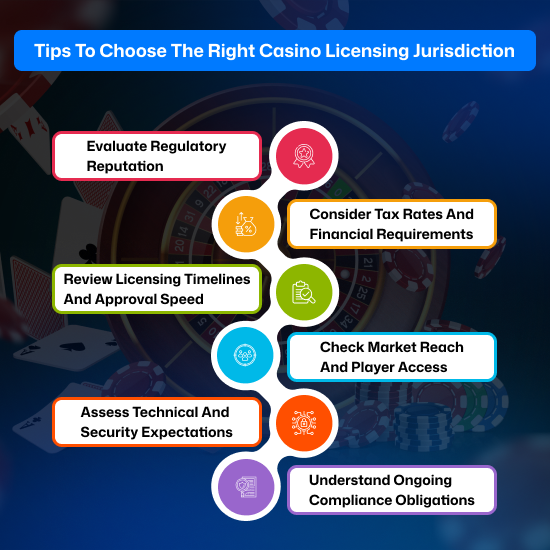
Evaluate regulatory reputation. Strong jurisdictions build trust with players and partners, helping your casino stand out in competitive markets with higher credibility.
Consider tax rates and financial requirements. Choosing a region with manageable taxes supports profitability while ensuring your business can meet ongoing financial obligations confidently.
Review licensing timelines and approval speed. Faster approval processes help you launch sooner, but they must still provide solid regulatory oversight for long-term stability.
Check market reach and player access. Some licenses unlock larger global markets, making jurisdiction choice directly impact your brand’s visibility and growth potential.
Assess technical and security expectations. Different regions set different security standards; understanding their requirements helps you prepare systems that meet regulatory expectations.
Understand ongoing compliance obligations. Some jurisdictions require frequent audits or additional reporting. Choosing one that aligns with your capabilities avoids future compliance strain.
Selecting the right license jurisdiction always remains in your favor to managing an online casino website.
Casino regulations will keep evolving with new technologies, player safety measures, and global standardization, shaping how operators develop long-term strategies.
Stricter responsible gambling requirements. Regulators will demand more proactive player protection, including AI-driven monitoring, personalized limits, and early-risk detection systems.
Greater transparency in marketing practices. Advertising rules will tighten, requiring clearer messaging and protecting vulnerable audiences from misleading or aggressive promotions.
Enhanced identity verification methods. Biometric checks and advanced verification tools will become standard, making player onboarding more secure and highly accurate.
Higher data security expectations. Regulators will expect stronger cybersecurity frameworks as threats increase, pushing operators to invest in advanced protection systems.
More unified global standards. Countries may move toward shared regulatory frameworks, making it easier for compliant operators to expand into new markets without duplication.
Integration of blockchain and verified transaction systems. Blockchain’s transparency may influence future regulations, improving audit accuracy, transaction security, and player trust.
Operators who invest early in compliance automation, cybersecurity, and transparent business practices will be positioned ahead of competitors.
Launching a casino website in 2026 requires deep knowledge of licensing procedures, jurisdictional requirements, financial obligations, and ongoing compliance. Operators that prioritize legal stability and responsible operation gain trust, long-term resilience, and competitive advantage. By building a strong regulatory foundation, platforms can enter the market confidently and sustainably.
Having a website has become necessary for all sizes of businesses in this digital world. Whether you...
The online casino industry is getting more attention, but with opportunity comes intense competition...
We know that in 2025, having an advanced and safe online casino website design is a key element to a...
In the high-stakes world of online gaming, your casino website is more than just a virtual storefron...
Everyone has seen the online casino industry grow. It is popular because it offers the convenience o...
Having a professional website for your apartment tenant service is such a valuable business asset. B...

Not sure which template or UI kit fits your project? Reach out for expert advice.